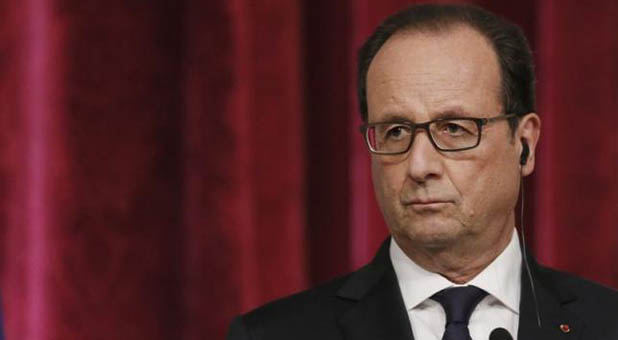France Needs to Look at How It’s Treated Israel
French President François Hollande is disturbed that President Donald Trump criticized a U.S. ally, describing the terrorism that has plagued France in recent years as the product of an open border policy. Yet it is Hollande who should self-reflect on his own criticism of a French ally.
“Take a look at what’s happening in Germany,” Trump said at the recent Conservative Political Action Conference. “Take a look at what’s happened in France. Take a look at Nice and Paris. We fully understand that national security begins with border security.”
Hollande responded to Trump’s comments with some pique, saying, “I think it’s never a good idea to show the least disapproval with respect to an ally. I wouldn’t do that to an ally and I would ask that the American president not do that with regard to France.”
That would be a policy of extreme forbearance—never to publicly express “the least disapproval” or doubt about an ally’s policy, or a situation produced by a policy?
Where would that leave former French President Jacques Chirac, who publicly attacked President George W. Bush’s decision to invade Iraq as “unwarranted” and “unjustified” and expressed “great reservations” about Bush’s doctrine of pre-emption?
For that matter, where would it leave France’s current uninhibited criticism of Israeli policies, like permitting Jews to live and build homes in communities in the West Bank?
This January, Hollande said, “The two-state solution is threatened due to settlements, as well as terrorists who were always afraid of peace.” Back in 2013, he declared, “France calls for the total and definitive end to settlement building because it compromises the two-state solution.”
With these statements, Hollande not only displayed the “least disapproval” of a friendly country, but publicly rebuked that nation. (Moreover, Palestinian terrorists are not “afraid of peace,” as Hollande argued—they oppose peace until Israel disappears. But that is another matter.)
Hollande’s remarks are not an exceptional case of Gallic brusqueness. In 2009, his predecessor, President Nicolas Sarkozy, declared very publicly—in an address to the Knesset in Jerusalem, no less—that peace “cannot be achieved without a complete and immediate cessation of the settlements … Peace cannot be achieved without the recognition of Jerusalem as the capital of two states and guaranteeing freedom of access to holy sites for all religions.”
In short, French presidents, past and present, have felt free to publicly criticize Jewish residence in the West Bank as at least partially responsible for the lack of peace. They have challenged the national unity of Israelis who oppose re-dividing Jerusalem.
French officials have gone even further. In 2001, without citing any specific Israeli policy, France’s ambassador to the U.K. at the time, Daniel Bernard, felt free to assert that “all the current troubles in the world are because of that [obscenity] little country Israel.”
Bernard was not apologetic, nor was he sacked. The French Foreign Ministry even decried the “malevolent insinuations” that Bernard was anti-Semitic.
The broader question is not whether criticism of an ally in any given instance is correct or mistaken, but rather, whether it can or should be expressed. Certainly, French leaders have often believed that such criticism can and should be voiced.
Why, then, does Hollande take offense when Trump states the obvious—that mass immigration to Europe from the Middle East has greatly enlarged the Muslim communities from which radical Muslim terrorists have sprung? This was not even an explicit criticism of French immigration and security policies, though it was certainly an implied one.
It was also a well-based critique. The perpetrators of the January 2015 Paris massacres at the headquarters of the satirical magazine Charlie Hebdo (12 murdered) and at the Hyper Cacher supermarket (four murdered) were all children of Muslim immigrants. The perpetrators of the November 2015 mass-casualty attacks in Paris (130 murdered) consisted of both foreign- and local-born radical Muslims, including several who had fought in Syria and several who entered France amid the flow of refugees from Muslim-majority countries.
More recently, the perpetrator of the July 2016 truck massacre in Nice (86 murdered) was an immigrant from Tunisia.
Clearly, identifying and preventing radical Muslims from entering a country is not a complete solution—a perfectly moderate Muslim with no past terrorist associations can immigrate, only to radicalize later, as the Nice attack perpetrator did. But a wiser immigration policy is surely a vital element of any responsible effort to protect such a country.
Trump has promised no less for America, and the record as it already stands obliges him to act on this imperative—according to a 2016 report by the Senate Subcommittee on Immigration and the National Interest, 380 out of 580 people convicted in terror cases since 9/11 were foreign-born.
Of course, if French leaders want to adopt a policy of desisting from all public criticism of allies, both the U.S. and Israel would undoubtedly be pleased. In the meantime, everyone, including Hollande, must roll with the punches.
Morton A. Klein is national president of the Zionist Organization of America.
This article was originally published at JNS.org. Used with permission. {eoa}














































